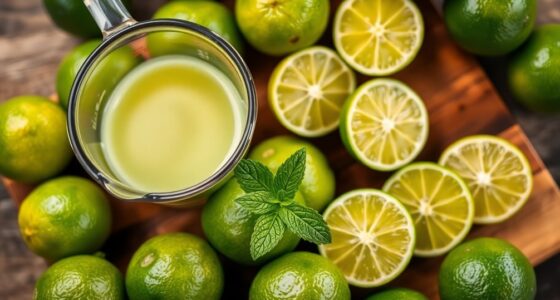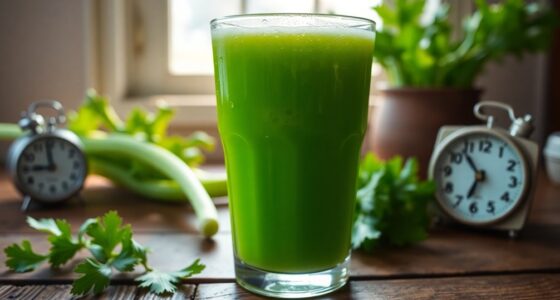Fresh juice’s shelf life varies by juicer type. If you use a centrifugal juicer, your juice is good for about 24 hours in the fridge. Masticating juicers extend that to about 48 hours, while twin gear juicers can keep juice fresh for 4-5 days. To maximize freshness, store your juice in airtight glass containers and keep it at 35-40°F. Want to discover more tips on juicing and storage? There’s much more to explore! Additionally, when making juices, it’s essential to consider the ingredients you use, as some fruits and vegetables have a higher oxidation rate than others. For those looking to preserve the vibrant flavor of their citrus juices, learning how to store fresh lemon juice can significantly enhance its shelf life and maintain its zesty taste. Always remember to label your containers with the date to keep track of freshness and enjoy your juices at their best!
Key Takeaways
- Centrifugal juicer juice is best consumed within 24 hours when stored in the fridge.
- Masticating juicer juice can last up to 48 hours in the refrigerator.
- Juice from twin gear juicers can remain fresh for 4-5 days with proper storage.
- Storing juice in airtight glass containers minimizes air exposure and nutrient degradation.
- Freezing juice can extend its shelf life to 12-16 months, maintaining optimal taste within 2-3 months.

When you juice fresh fruits and vegetables, you may wonder how long that vibrant concoction will stay fresh. The answer can vary based on the type of juicer you use and how you store your juice.
Generally, if you've made your fresh juice using a centrifugal juicer, it'll typically last up to 24 hours in the fridge. That's because this method exposes your juice to more air, leading to faster nutrient degradation. If you use a masticating juicer, however, you can enjoy your juice for up to 48 hours. This juicer processes the produce more gently, reducing oxidation and preserving more of those valuable nutrients.
For those who want their juice to last even longer, twin gear juicers, like the Greenstar Elite, can be a great investment. Juice extracted with these machines can remain fresh for an impressive 4-5 days. This is due to their superior method of extraction, which provides better protection against oxidation compared to both centrifugal and masticating juicers.
So if you're juicing in bulk, consider using a twin gear juicer for the best shelf life.
When it comes to storing fresh juice, how you do it can make a big difference. To slow down the process of nutrient degradation, always store your juice in airtight glass containers. This minimizes exposure to air, which is one of the main culprits in reducing the shelf life of your juice.
Make sure to keep your container in the fridge, ideally at a temperature between 35-40°F (1.6-4.4°C). This ensures that your juice maintains its freshness and nutritional value for as long as possible.
If you're planning to juice in advance or have leftover juice that you can't consume within a few days, consider freezing it. Freezing juice can extend its shelf life to an impressive 12-16 months. However, for optimal taste and nutrition, it's best to consume frozen juice within 2-3 months.
When you're ready to enjoy your juice, simply thaw it in the fridge or at room temperature, but avoid using a microwave, as that can degrade the nutrients.
Frequently Asked Questions
How Long Are Juices Good for After Juicing?
When you juice, the freshness of your drink depends on the method you use.
Generally, juices from centrifugal juicers last about 24 hours, while masticating juicers can keep them fresh for up to 48 hours.
If you use a twin gear juicer, your juice might stay good for 4-5 days.
To maximize freshness, always refrigerate your juice at the right temperature and store it in airtight glass containers.
Do You Have to Drink Juice Immediately After Juicing?
You don't have to drink juice immediately after juicing, but it's best if you do.
Fresh juice starts losing its nutrients quickly once exposed to air. If you need to save it, store it in an airtight glass container and refrigerate it.
Adding lemon juice can help slow down oxidation.
Just remember, the longer you wait, the less fresh and nutritious your juice will be, so enjoy it soon!
How Long Can Freshly Squeezed Juice Last in a Mason Jar?
Freshly squeezed juice can last up to 72 hours in a mason jar when stored in the refrigerator.
To keep it tasting great and nutritious, use an airtight jar to limit oxygen exposure. Filling the jar to the top minimizes air, which helps maintain freshness.
If you want to store it longer, freezing your juice in mason jars lets it last for 12-16 months while preserving most of its nutrients.
Enjoy your juice!
What Is the 80/20 Rule for Juicing?
Ever wonder how to make your juice not just tasty but also nutritious?
The 80/20 rule for juicing suggests you fill 80% of your juice with vegetables and just 20% with fruits. This balance helps you maximize vitamins and minerals while keeping sugars in check.
Conclusion
In the grand journey of fresh juice, time is both a friend and a foe. Just like a blooming flower that wilts under the sun, your juice thrives best within 24 hours after juicing. Beyond that, it risks losing its vibrant essence and vital nutrients. So, sip it soon, savoring each drop as though it’s a fleeting moment in a beautiful day. Remember, every glass tells a story—drink it before the tale fades away. As you contemplate the beauty in each glass, don’t forget to mind the orange juice shelf life considerations. Keeping your juice in an airtight container and away from light can help preserve its delightful flavors and nutrients for just a bit longer. However, the magic truly lies in consuming it fresh, allowing you to experience the full symphony of flavors that nature intended. Embrace the moment, and let your taste buds embark on this exquisite adventure.
Cindy thoroughly researches juicing trends, techniques, and recipes to provide readers with practical advice and inspiration. Her writing style is accessible, engaging, and designed to make complex concepts easy to understand. Cindy’s dedication to promoting the advantages of juicing shines through her work, empowering readers to make positive changes in their lives through the simple act of juicing.
















